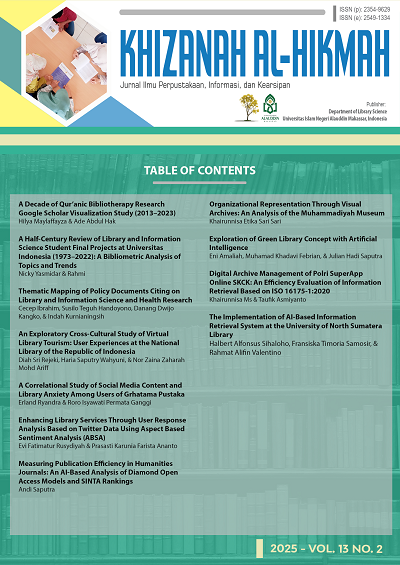Exploration of Green Library Concept with Artificial Intelligence
DOI:
https://doi.org/10.24252/v13i2a10Keywords:
Artificial Intelligence (AI), Library Services, Green libraryAbstract
The rise of green libraries signifies an increasing commitment to sustainability within library operations. These initiatives seek to reduce environmental impact through decreased paper consumption, efficient energy use, and environmentally responsible management practices. Simultaneously, the integration of Artificial Intelligence (AI) presents new opportunities to enhance operational efficiency and the quality of library services. This study investigates the intersection of green library practices and AI adoption through a descriptive qualitative literature review. The findings indicate that AI technologies, such as Natural Language Processing (NLP), chatbots, and automated systems can streamline cataloging processes, enhance information retrieval, and lessen dependence on physical resources. AI also contributes to energy efficiency through smart building management systems that automate lighting, heating, ventilation, and air conditioning (HVAC), thereby reducing overall carbon emissions. Furthermore, AI-assisted services expand social inclusivity by improving accessibility for users with disabilities and supporting remote and underserved communities. The bibliometric mapping analysis reveals a growing scholarly interest in sustainable innovation within library services. The study concludes that the synergy between green library initiatives and AI integration not only advances progress toward the Sustainable Development Goals (SDGs) but also positions libraries as proactive agents of environmental and social transformation. This research contributes to ongoing discussions on sustainable digital transformation in the library sector.
Downloads
References
Adigun, G. O., Ajani, Y. A., & Enakrire, R. T. (2024). The Intelligent Libraries: Innovation for a Sustainable Knowledge System in the Fifth (5th) Industrial Revolution. Libri, 74(3), 211–223. https://doi.org/10.1515/libri-2023-0111
Ajani, Y. A., Tella, A., & Enakrire, R. T. (2024). The green library revolution: a catalyst for climate change action. Collection and Curation, 43(2), 60–67. https://doi.org/10.1108/CC-10-2023-0032
Ayu Pratiwi, M., Syahbaniar, D., & Hanif Robbani, A. (2024). WIDYA (Web Information Dialog Your Assistant): AI-Powered Chatbot for Library Online Service Innovation. Jurnal FPPTI, 2(2), 42–52. https://doi.org/10.59239/jfppti.v2i2.31
Budianto, T. H., Vista, U. F., & Putra, G. B. (2022). Design a library information system for a green library in Bangka Regency. IOP Conference Series: Earth and Environmental Science, 1108(1). https://doi.org/10.1088/1755-1315/1108/1/012045
Chatterjee, S., & Dey, B. (2023). STRATEGIES OF LIBRARY MATERIALS DIGITIZATION IN AN ACADEMIC LIBRARY: A STUDY. International Journal of Research -GRANTHAALAYAH, 11(6). https://doi.org/10.29121/granthaalayah.v11.i6.2023.5948
Corrado, E. M. (2024). Environmental Sustainability and Libraries. Technical Services Quarterly, 41(3), 265–274. https://doi.org/10.1080/07317131.2024.2357015
Cox, A. M., & Mazumdar, S. (2024). Defining artificial intelligence for librarians. Journal of Librarianship and Information Science, 56(2), 330–340. https://doi.org/10.1177/09610006221142029
Febriyanti, E., & Fitri, I. (2024). The Potentiality of Eco-Library Design in Medan City Towards Sustainability Development. IOP Conference Series: Earth and Environmental Science, 1404(1), 012022. https://doi.org/10.1088/1755-1315/1404/1/012022
Kumar, K., Alma’awali Zainab Mohammad Nabhan, Almorani, N. M. S., & Sharma, K. C. (2023). Framework for Implementation of Sustainable Green Information Technology in Library Digitalization. Journal of Energy Engineering and Thermodynamics, 31, 31–37. https://doi.org/10.55529/jeet.31.31.37
Gupta, N. K., Namdeo, D. K., Dubey, D., & Gupta, Dr. S. (2023). Artificial Intelligence, Robotics And Its Applications In Green Libraries. Journal of Survey in Fisheries Sciences, 10(1), 3979–3987. https://doi.org/10.53555/sfs.v10i1.1823
Hafit, A. binti, & Abdullah, C. Z. (2018). Implementation of Green Technology in Library: A Proposed Framework. International Journal of Academic Research in Business and Social Sciences, 7(12), 507–514. https://doi.org/10.6007/ijarbss/v7-i12/3631
Kulkov, I., Kulkova, J., Rohrbeck, R., Menvielle, L., Kaartemo, V., & Makkonen, H. (2023). Artificial intelligence - driven sustainable development: Examining organizational, technical, and processing approaches to achieving global goals. 32(3), 2253–2267.
Latif, A., Khalid, A., Rasheed, A., & Mirza, T. (2023). Eco Literacy: Assessing the Contribution of Public Sector College Libraries of Bahawalpur District. Journal of Social Sciences Review, 3(1), 659–666. https://doi.org/10.54183/jssr.v3i1.207
Liu, X., Cifuentes-Faura, J., Zhao, S., Wang, L., & Yao, J. (2025). Impact of artificial intelligence technology applications on corporate energy consumption intensity. Gondwana Research, 138, 89–103. https://doi.org/10.1016/j.gr.2024.09.003
Mochammad, R., Ardika MS, R., & Cahyono, T. Y. (2020). Library 4.0: Eco-Blended Library and Library Inclusion. Khizanah Al-Hikmah: Jurnal Ilmu Perpustakaan, Informasi Dan Kearsipan, 8(2), 116–129. https://doi.org/10.24252/kah.v8i2a2
Monyela, M., & Tella, A. (2024). Leveraging artificial intelligence for sustainable knowledge organisation in academic libraries. 90(2), 1–11. https://doi.org/10.7553/90-2-2396
Mwanzu, A., Bosire-Ogechi, E., & Odero, D. (2023). The Emergence of Green Libraries in Kenya: Insights From Academic Libraries. The Journal of Academic Librarianship, 49(5), 102601. https://doi.org/https://doi.org/10.1016/j.acalib.2022.102601
Putra, D. D. (2025). Exploring Green Libraries Innovation toward Environmental Sustainability in Indonesia: A Systematic Literature Review. IOP Conference Series: Earth and Environmental Science, 1439(1), 012023. https://doi.org/10.1088/1755-1315/1439/1/012023
Shahzad, K., Khan, S. A., Iqbal, A., & Javeed, A. M. D. (2024). Identifying university librarians’ readiness to adopt artificial intelligence (AI) for innovative learning experiences and smart library services: an empirical investigation. Global Knowledge, Memory and Communication. https://doi.org/10.1108/GKMC-12-2023-0496
Sreeja Ramachandran. (2024). Transforming Libraries Sustainably: A Synergy of AI and Machine Learning. International Journal of Advanced Research in Science, Communication and Technology, 398–401. https://doi.org/10.48175/IJARSCT-15354
Sugiyono. (2023). Metode Penelitian Kualitatif (Untuk Penelitian Yang Bersifat: Eksploratif, Enterpretif, Interaktif Dan Konstruktif) (Sofia Yustiyani Suryandari, Ed.). Alfabeta.
Verdecchia, R., Sallou, J., & Cruz, L. (2023). A systematic review of Green AI. Wiley Interdisciplinary Reviews: Data Mining and Knowledge Discovery, 13(4), 1–26. https://doi.org/10.1002/widm.1507
Vijesh, P. V., Chopade, V., Joy, V., & Joseph, M. K. (2024). Designing a Green Library in Alignment with the UN’s Sustainable Development Goal: a Case Study of Rajagiri Business School Library, Kerala, India. Electronic Green Journal, 2024(49). https://doi.org/10.5070/G314960177
Wardhani, D. K. (n.d.). SIKAP PUSTAKAWAN TERHADAP DESAIN GREEN BUILDING DI PERPUSTAKAAN ITS SURABAYA. Journal Unair, 1–10.
Zhou, H. (2023). Research on the Development of University Libraries in the Era of Artificial Intelligence (AI). The Frontiers of Society, Science and Technology, 5(7), 109–113. https://doi.org/10.25236/fsst.2023.050719
Published
How to Cite
Issue
Section
License
Copyright (c) 2025 Eni Amaliah, Muhamad Khadavi Febrian, Julian Hadi Saputra

This work is licensed under a Creative Commons Attribution-NonCommercial-ShareAlike 4.0 International License.
By submitting your manuscript to our journal, you are following Copyright and License



